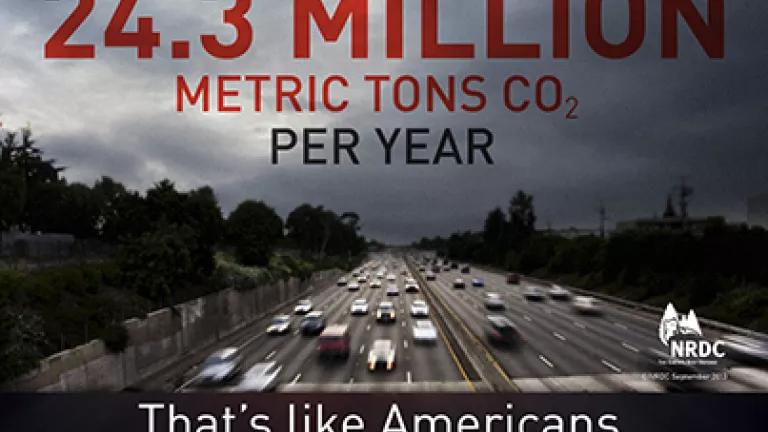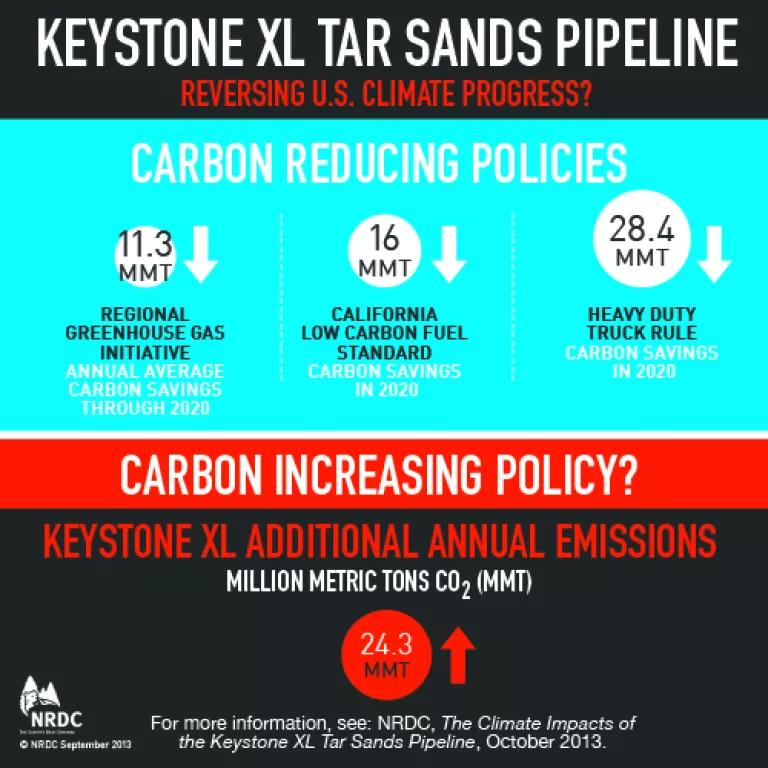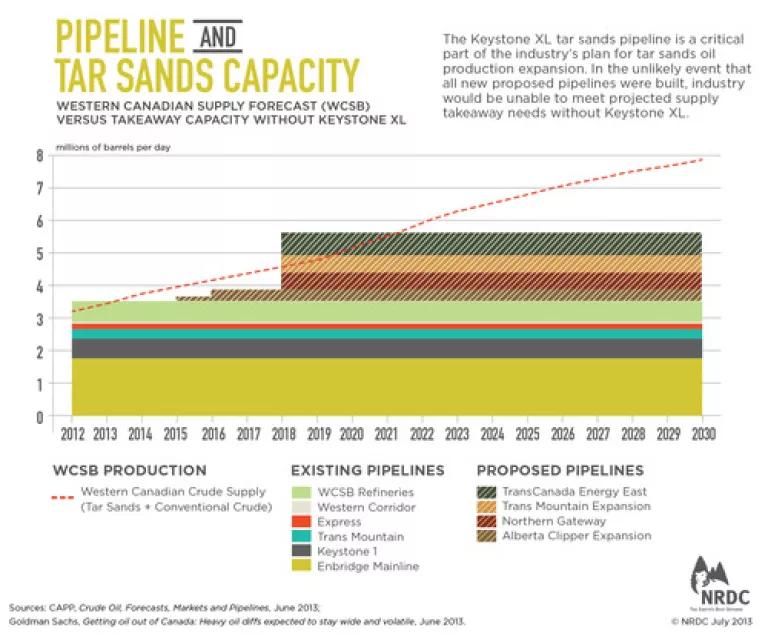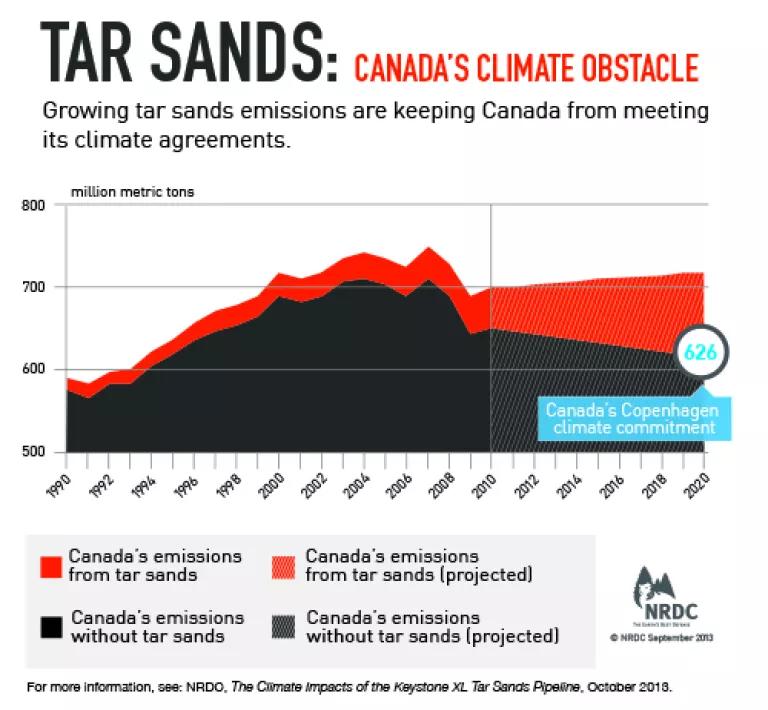
The proposed Keystone XL tar sands pipeline fails the President's climate test, as illustrated by a factsheet released by NRDC this week. Keystone XL would increase the profitability of producing tar sands, which would accelerate the pace and expand the scale of carbon-heavy tar sands development in Alberta. In fact, Keystone XL is a necessary ingredient in the oil industry's pursuit of its aggressive plans to triple tar sands production by 2030 – a plan which is irreconcilable with Canada’s international climate commitments. And construction of Keystone XL would undermine some of the most ambitious and hard-won U.S. climate policies. As a single, discrete decision, denial of a Presidential Permit for Keystone XL is one of the most effective ways the United States can move forward on climate.
In greater detail, here are the facts about Keystone XL and carbon pollution:
From the tar sands mine or drilling operation to the automobile gas tank, tar sands greenhouse gas emissions are 81 percent greater than those of conventional oil. Keystone XL, by moving 830,000 barrels per day of tar sands into the Gulf and offsetting less carbon intensive crudes, would generate up to 24.3 million metric tons of additional annual carbon emissions. To put that in perspective, to make up for that, Americans would have to drive 60 billion fewer miles per year.
Tar sands from Keystone XL would replace less carbon intensive conventional crude, not heavy Venezuela crude. Proponents of Keystone XL are now arguing that tar sands from Keystone XL would simply replace heavy crudes from Venezuela, which are almost as carbon intensive as tar sands. There are a number of flaws with this argument:
- Venezuela owns the Gulf refineries processing its crude. Diminishing volumes of Venezuela crude being imported in the Gulf is primarily process by refineries owned by the Venezuela state owned oil company Citgo. Needless to say, Venezuela is unlikely to displace its own crude from its refineries if Keystone XL is approved.
- Other Gulf Coast refineries are busy processing increasing volumes of light, less carbon intensive domestic crudes. While many refineries on the Gulf Coast are able to process heavy crudes, without Keystone XL they have turned to lighter, less carbon-intensive domestic crude oils as heavy crude imports from Venezuela and Mexico have declined. In fact, Department of Energy (DOE) data show that refineries on Texas’s Gulf Coast are processing lighter crudes than they have been in more than a decade. And they’re busy doing it – DOE data shows Texas Gulf refineries are operating closer to their maximum capacity than they have in years.
Rejecting Keystone XL propels America forward on climate. As a single, discrete decision, rejecting Keystone XL would avoid carbon emissions on a scale similar to some of the most ambitious carbon emission-reduction programs currently under way in the United States. In one stroke of the pen, Keystone's rejection would save this country 18.7 million to 24.3 million metric tons of CO2e per year -- a benefit comparable to the annual savings from new U.S. heavy-duty truck emission and efficiency standards (28.4 million metric tons).

Keystone XL is the linchpin on which rests the pace of tar sands production and the scale of tar sands expansion plans.The tar sands industry falsely claims that because of multiple options for transporting tar sands oil, tar sands expansion -- with or without Keystone XL -- is inevitable. But the fact is, if the Presidential Permit is denied and Keystone XL is not built, there would be fewer tar sands mines and drilling projects.
Tar sands companies are currently constrained in their ability to deliver tar sands oil to the limited number of refineries that are both equipped to process tar sands and have port access to lucrative overseas diesel markets. In fact, export pipelines from the tar sands region are expected to reach capacity before 2015. Without Keystone XL's access to Texas Gulf Coast refineries -- which have the heavy crude refining capacity and port access oil companies crave -- much of the tar sands will remain landlocked.

Keystone XL is the largest of the proposed tar sands pipelines and the farthest along in the permitting process. Even if all the other proposed new export pipelines were built (which is highly unlikely, given the wide range of obstacles they face), they could not supply the export capacity needed to meet the tar sands industry's goal of tripling tar sands production by 2030.
Additionally, rail is not an economical option for supporting significant expansion of tar sands production, and tar sands oil has largely been absent from the current crude-by-rail boom.
Given Canada's track record of untrustworthy climate policies, expecting Canada to reduce tar sands greenhouse gas emissions is unrealistic. Canada's climate policies do not counteract significant greenhouse gas emissions growth, nor do they meet the country's stated international climate targets. In recent years, Canada has repeatedly made firm commitments to reduce its greenhouse gas emissions and has never followed through. Current regulations in Alberta are inadequate, and despite promises from the last four Canadian environmental ministers, the Canadian federal government has failed to introduce rules that effectively limit greenhouse gas pollution from Canada's oil and gas sector.
Despite Canada's dubious record as a good-faith actor on climate, Prime Minister Harper reportedly wrote President Obama a letter offering another commitment in return for Keystone XL. Canada cannot meet its climate obligations while maintaining its policy of unchecked tar sands expansion, a reckless policy in which Keystone XL would play a critical role.

These facts make it clear: Keystone XL fails the president's climate test. It significantly exacerbates the problem of carbon pollution. It is not in the national interest, and its Presidential Permit should be denied.

